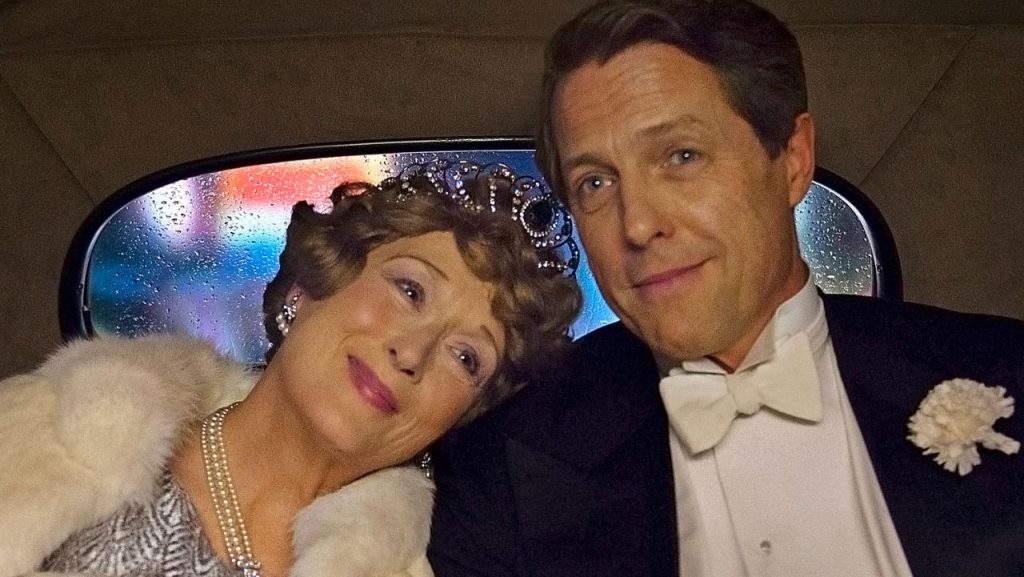Meryl Streep is a national treasure; I will not dispute that fact. She’s good in anything she does. However, everything she does is not necessarily good. Such is the case with her new movie, Florence Foster Jenkins. Something about its trailer gave me a bad feeling and the completed project did little to change my mind about it… for different reasons, though.
It looked very much like the movie would be a lightweight comedy for older audiences utilizing a familiar, manipulative, “feel good” formula. You know, one of those movies that you fight to like, yet always sucks you in at some point during it. It turns out that Florence Foster Jenkins could have used more of that tone, not less.
My biggest complaint lies in the screenplay by Nicholas Martin. It’s based on the true story of an American socialite and amateur soprano who was well known, but ridiculed, for her complete lack of singing ability. It’s a fascinating story, but the movie doesn’t do enough to explain why she was driven to perform, her “career” culminating in a 1944 Carnegie Hall concert.
You can construct an explanation with clues the story provides, but it’s ultimately an unsatisfying way to conclude your viewing experience. I needed to see a reason Jenkins was so driven, rather than watching her husband, St. Clair Bayfield (Hugh Grant), and pianist, Cosme McMoon (Simon Helberg), simply enable her. Why do they do it?
 This makes Jenkins a deluded woman with a huge ego rather than a sympathetic character whom we also want to enable. She doesn’t even seem to get much joy out of her experiences; we’re just told how much music means to her. Why does it mean so much to her? As a result, we’re cheering for Meryl Streep, not Florence Foster Jenkins. I was disappointed by this.
This makes Jenkins a deluded woman with a huge ego rather than a sympathetic character whom we also want to enable. She doesn’t even seem to get much joy out of her experiences; we’re just told how much music means to her. Why does it mean so much to her? As a result, we’re cheering for Meryl Streep, not Florence Foster Jenkins. I was disappointed by this.
I was actually more impressed by what Grant does in his role. Again, we don’t know why, but based on his performance, I know in my heart that Bayfield truly loves Jenkins, even though he has a girlfriend (Kathleen, Rebecca Ferguson) on the side. If it came down to a choice between the two, he would choose Jenkins.
The structure of Florence Foster Jenkins is odd to me. Plot points occur about every 30 minutes. For example, Streep/Jenkins doesn’t open her mouth to sing for the first time until 25-30 minutes into the movie. The first 30 minutes is set-up that has nothing to do with her singing, something you’d think would have been the driving force of the entire movie.
 Further, at about the hour mark, we learn – briefly – the answer about a medical condition that may be part of her motivation. Then, at a little less than the 90-minute mark, the set-up for the finale arrives when she begins planning her Carnegie Hall performance. That’s odd in itself. She shows no particular desire to sing at Carnegie Hall until almost 90 minutes into the movie.
Further, at about the hour mark, we learn – briefly – the answer about a medical condition that may be part of her motivation. Then, at a little less than the 90-minute mark, the set-up for the finale arrives when she begins planning her Carnegie Hall performance. That’s odd in itself. She shows no particular desire to sing at Carnegie Hall until almost 90 minutes into the movie.
This structure gives the impression that Jenkins is acting on whim. Would it not have been more effective if singing at Carnegie Hall was her lifelong dream and it took more work for her than simply renting it for a night during the last 20 minutes of the movie? We could then cheer for her… hope for her to succeed, so we could get the satisfaction when she does it.
Finally, because of this, we don’t understand the charm that audiences seem to find in her God-awful performances. They’re hilarious, don’t get me wrong, but it should take more than one person standing up in the audience telling them to stop laughing because she’s singing her heart out. Something did not convey the charm to me; how did those audiences get it?
I may be digging too deep into a movie that’s nothing short of a harmless summer blockbuster alternative for adults. I’m not saying I didn’t enjoy it. However, Florence Foster Jenkins really falls short of its potential. I want to know more about the real woman. I want to know why about so many things, not the least of which is, why the movie fails.

